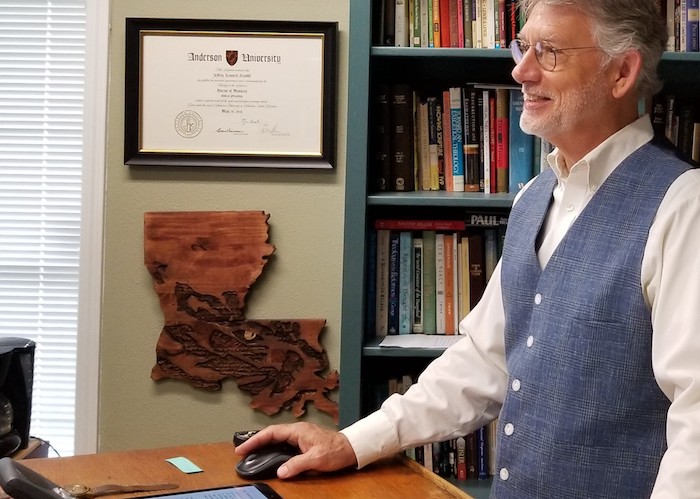For the first webinar held by the Clamp Divinity School at Anderson University, Dr. Jeff Stanfill encouraged fellow pastors to be faithful in four ways as they preach during the Coronavirus crisis:
- Be faithful about the event;
- Be faithful among the people;
- Be faithful in your calling;
- Be faithful to God.
Dr. Stanfill, a 2019 alumnus of AU’s Doctor of Ministry in Biblical Preaching program, shepherded members of Covenant Community Church through 18 months of uncertainty after the largest recorded flood in their region struck in 2016. The flood pushed water up to eight feet into 10,000 homes in the Baton Rouge, Louisiana, region. Dr. Stanfill and fellow alumnus Dr. Eric Ayala shared lessons they’ve learned about ministering during a crisis through a free, April 3 webinar.
An August 2016 Louisiana flood pushed 35 inches of water into Dr. Stanfill’s home and up to eight inches of water into three of his church’s four buildings. It took the church 18 months to move back into its buildings. Forty-five percent of Covenant’s 60-family congregation was affected by the flood, Dr. Stanfill said.
“It took quite a bit to recover,” he said.
Usual sources of reprieve and assistance, from motels to home improvement stores, were flooded too. That the flood “created a lot of inconveniences is a gross understatement,” Dr. Stanfill said.
Dr. Stanfill and his family were out of their home for seven months. During the recovery, he and other pastors in the region preached differently to meet the spiritual, physical, psychological, emotional and social needs of people weathering the crisis. A month before the flood, Dr. Stanfill enrolled in AU’s DMin program, using his ministry experience during the flood and its aftermath as the subject of his dissertation for the program.
“There are some things that could be redeemed from this,” said Dr. Stanfill, who interviewed seven other pastors from the region about how they preached in the months following the flood. He used his findings to write the dissertation, and those findings, including his own experiences, also prepared him to counsel other pastors during the current Covid-19 crisis.
Dr. Stanfill encourages pastors to be faithful in four domains to minister through crises:
1) Be faithful about the event: In other words, acknowledge that something devastating has happened/is happening but frame the event as an opportunity for people to obtain greater faith. Dr. Stanfill said pastors shouldn’t frame bad events as the result of divine judgement. The stress of crises, however do help us assess whether we are trusting in created things over the Creator.
“We uncover where our treasure is,” he said.
2) Be faithful among the people: Pastors need to meet the emotional needs of the people by acknowledging their grief, be it the inability to walk in a graduation ceremony or participate in a Little League baseball season. Crisis preaching should communicate that God understands, that He holds people’s future, and that He “will work it out” for the greater good. Crisis-time sermons should inspire hearers to take the next step to persevere or rebuild. The stories of Joseph in the Book of Genesis and the life of the Apostle Paul are great sources for such sermons, Dr. Stanfill said.
Even in the context of social distancing—a term Dr. Stanfill wishes was branded as simply “physical distancing”—churches should attend to people’s need to belong and connect. During Covid-19, Dr. Stanfill’s church conducts a Tuesday coffee-time Zoom meetup in addition to meeting via Zoom for Sunday service and Wednesday night prayer meetings.
3) Be faithful in your calling: In crises, pastors must continue to preach the gospel, which includes meeting both the physical and spiritual needs of the people. During Covid-19, that may mean sharing resources—from shopping for senior citizens to simply informing people of when senior shopping hours are. Spiritually, this preaching emphasis reminds people that in the midst of their crisis, they are not forgotten by God, as the Bible describes in Genesis 8:1: “But God remembered Noah and all the wild animals and the livestock that were with him in the ark, and he sent a wind over the earth, and the waters receded.”
Dr. Stanfill said preachers should tell people that the crisis is temporary, but God’s purpose is still in place. To be faithful to the calling, preachers must keep preparing to deliver skillful sermons and trust the power of God to work through the pulpit. In the Covid-19 crisis, more people are open to hear the Gospel than in the last 50 years, Dr. Stanfill said.
4) Be faithful to God: In crises, pastors must have an attitude of personal devotion to God, which should include humility, from acknowledging that only God knows the future, to heeding the instruction of governmental leaders. Pastors should also display humility in listening to church members who may need to vent about the stress caused by the crisis.
In the webinar “Ministry in the Midst of a Crisis: Exploring Ministerial Responses to Covid-19,” Clamp Associate Dean Dr. Kristopher K. Barnett interviewed Dr. Stanfill and Dr. Ayala about the findings of their dissertations. Dr. Ayla shared his analysis of sermons preached by John Chrysostom, a church father, during a civil crisis in the ancient Greek city of Antioch in the 380s. Dr. Ayala’s remarks demonstrated how to preach in a politically polarized environment, Dr. Stanfill said.
Dr. Barnett said pastors found the webinar insightful.
“In the current crisis, I have seen a proliferation of ‘experts’ advising pastors and leaders on how to lead in a crisis,” Dr. Barnett said. “While many of these ‘experts’ are simply guessing because this is a once in a lifetime crisis, our students had researched fields that offered some specific insight on the situation, so we felt that their perspectives could help pastors.”
To watch a recording of the webinar visit https://youtu.be/X8mQhMIAZkA.

